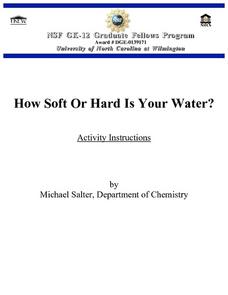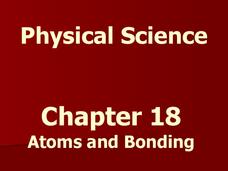Creative Chemistry
Acids, Alkalis, and Salts
In this activity, learners review the definitions of acids, bases, and salts. They also describe the differences between acids and alkalis and define neutralization. This activity has two short answers and one problem to solve.
Curated OER
Acids and Bases Worksheet
In this acids and bases worksheet, students determine the pH and pOH for a given solution. Students determine the conjugate acids for the given species. Students calculate which solution will have a higher pH. This worksheet has 16...
Curated OER
Acids and Bases Are All Around
In this acids and bases activity, students read a 1 page article on acids and bases and answer 10 true or false, short answer, multiple choice and/or fill in the blank questions or statements referring back to the article.
Curated OER
How Soft or Hard is Your Water?
Students test samples of water to determine how a chemical water softener affects water's ability to form suds. After collecting their data and analyzing their results, students answer follow-up questions about their lab.
Curated OER
Water Quality And pH
Learners determine the pH level of water and its effect on aquatic plants and brine shrimp eggs. This is a three part instructional activity that leads the student through the development of an understanding of water pH. They form a...
Curated OER
Chemical Reactions
In this reactions worksheet, young scholars state the differences between a coefficient and subscript and an exothermic and endothermic reaction. Students review the different types of reactions. This worksheet has 13 short answer...
LABScI
Acids and Bases: Cabbage Juice pH Indicator
Explore the range of pH using an assortment of household liquids. Scholars create their own pH indicators from cabbage and determine the pH of several liquids. To further their exploration, individuals use the same liquids to create...
Curated OER
Groups of Elements
Element groups are located in the periodic table by blinking on and off. A slide is then dedicated to each of the groups, explaining which elements are included and what common chemical properties they share. This topic is presented in...
Curated OER
Properties of Metals
Fifth graders study the properties of metals and use them to identify different properties. In this metal properties instructional activity students complete a demonstration .
Curated OER
What do Atoms Look Like?
In this atoms worksheet, students complete 58 questions about the atomic radius of atoms, the ionization energy, the valence electrons, metals, non-metals and semi-metals and the families of elements.
Curated OER
What do Atoms Look Like?
In this atom worksheet, students complete 60 questions about the trends in atoms such as ionization energy and atomic radius, about valence electrons, about the families of elements, about metals, non-metals and semi-metals, about the...
Curated OER
Denaturing Proteins
High schoolers investigate how to denature proteins. In this denaturing protein lesson plan, students explore the different ways to denature proteins in the lab. They use heat, acids and bases, organic compounds and heavy metals to...
American Chemical Society
pH and Color Change
Did you know strong bases can feel slippery and slimy? Lesson allows scholars to practice using the pH scale to identify acids and bases and their strengths. By changing the concentration of an acid and a base, they create the entire...
Consortium for Ocean Science Exploration and Engagement (COSEE)
Ocean Acidification: Whats and Hows
Open this lesson by demonstrating the production of acidic carbon dioxide gas by activated yeast. Emerging ecologists then experiment with seashells to discover the effect of ocean acidification on shelled marine organisms. They measure...
California Academy of Science
Coral and Chemistry
Using cabbage juice as a pH indicator, future scientists explore the effect of increasing carbon dioxide on the pH of the ocean and relate it to the health of coral reefs. Ideal for an earth or environmental sciences course, this lesson...
American Chemical Society
Temperature Changes in Dissolving
Alia-Seltzer tablets cause a very obvious chemical change, but do they also cause a temperature change? Each class member explores hot/cold packs, discussing how these temperature changes occur. Groups then design and carry out their own...
Gobal Oneness Project
Passionate Pursuits
Not all technology is digital. Teach learners about the low-tech maker movement with a photo essay about six artisans from California and two articles about the local creator movement. After tackling the photo essay in small...
Texas State Energy Conservation Office
Fueling the Future
Future mechanical engineers and automotive technicians read about various solutions to using gasoline in cars. Included are electric, fuel-cell-powered, and hybrid vehicles.
Curated OER
Dental Chemistry Analogy
After taking in background information on teeth, marble, eggshell, and fluoride, chemistry aces design an experiment. Their goal is to demonstrate whether or not fluoride has a similar effect on marble or eggshell as it does on tooth...
Creative Chemistry
Finding the % of Fe2+ in Fe(NH4)2(SO4)2.xH2O and the value of x
Step-by-step procedures are outlined in the learning exercise and calculations for junior chemists to perform in their science journals. This laboratory exercise is intended for experienced chemistry learners.
Curated OER
The Nature of Salt
Students record information from the periodic table for sodium and chloride. They determine whether salts are molecular or ionic compounds, along with sodium chloride's molecular weight, and relative weights
Curated OER
WS 8.8 Molality and Colligative Properties
In this molality and colligative properties worksheet, students determine the molality of solutions and they calculate freezing point depressions and boiling point elevations of solutions.
Curated OER
Unit 3 Bonding
An organized table charting the different types of chemical bonds arrays this resource. The octet rule, ionization energy, and the naming of compounds are also reviewed. Young chemists answer review questions in multiple choice fashion....
Mr. E. Science
Atoms and Bonding
I don't trust atoms because they make up everything. Budding scientists learn about famous scientists connected to atomic models, chemical, ionic, and hydrogen bonds. The presentation also presents how to count atoms...























